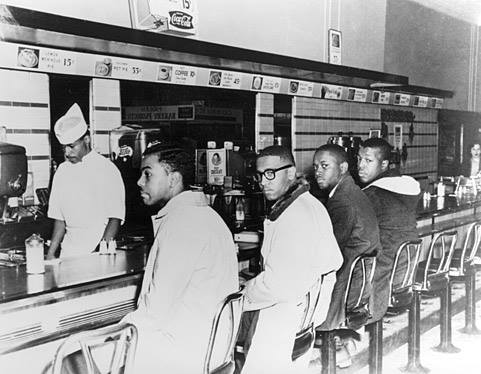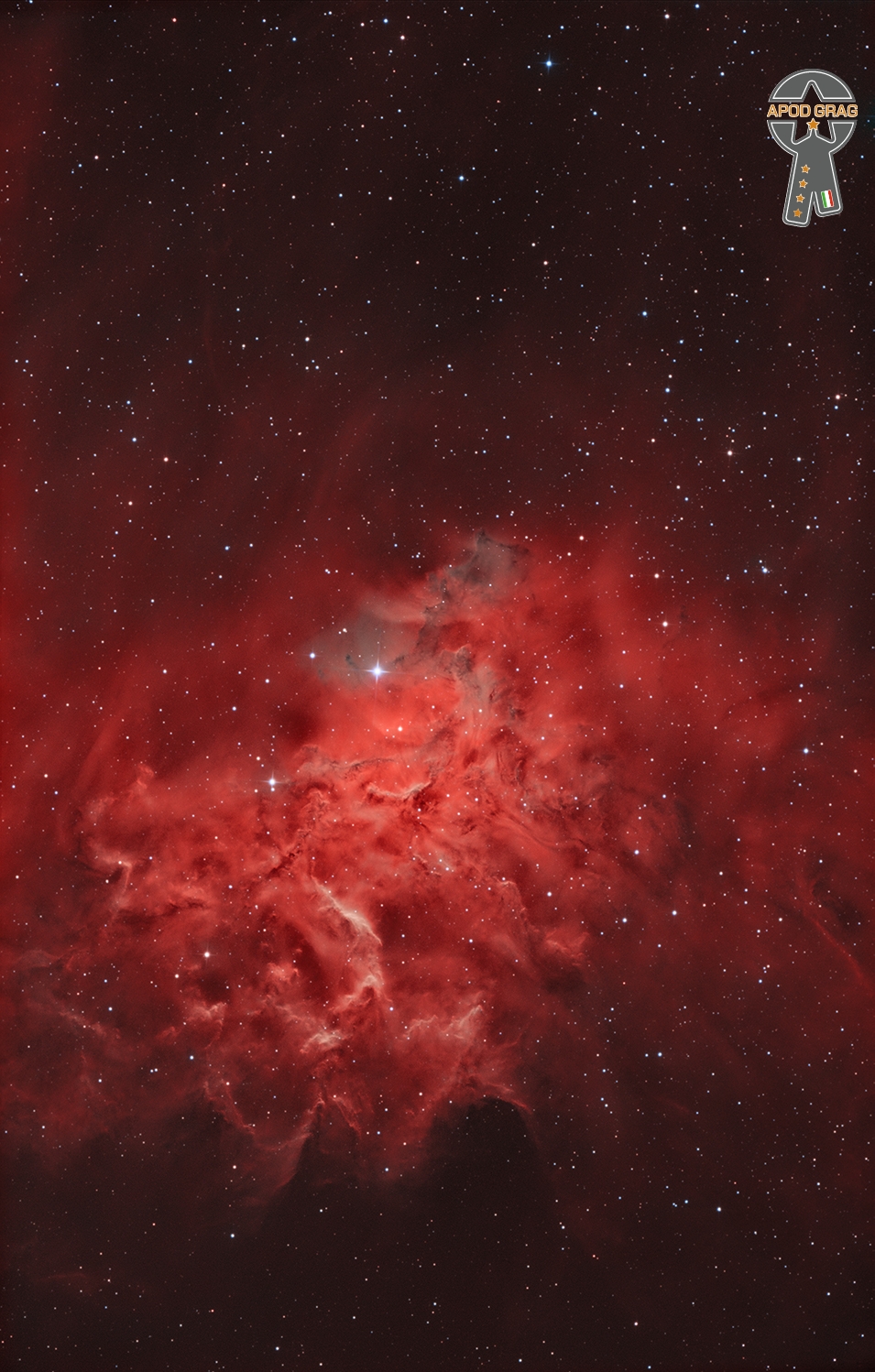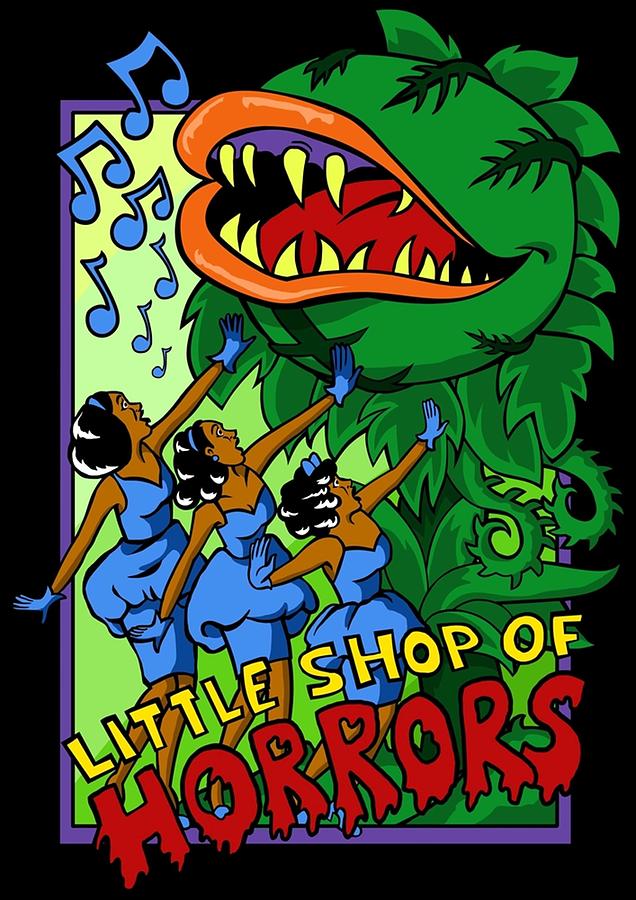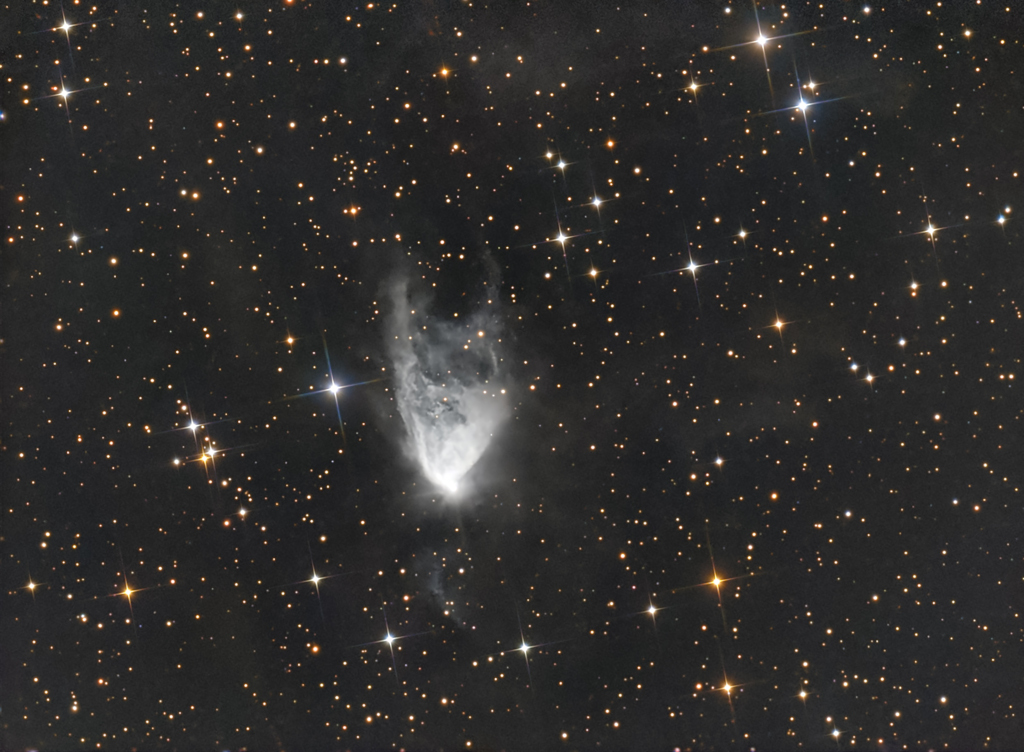Blog

IC 405 (also known as the Flaming Star Nebula, SH 2-229, or Caldwell 31) is an emission and reflection nebula in the constellation Auriga north of the celestial equator, surrounding the bluish, irregular variable star AE Aurigae. It shines at magnitude +6.0. Its celestial coordinates are RA 05h 16.2m dec +34° 28′. It is located near the emission nebula IC 410, the open clusters M38 and M36, and the K-class star Iota Aurigae.
The nebula measures approximately 37.0′ x 19.0′, and lies about 1,500 light-years away from Earth. It is believed that the proper motion of the central star can be traced back to the Orion’s Belt area. The nebula is about 5 light-years across.

James Mercer Langston Hughes (February 1, 1901 – May 22, 1967) was an American poet, social activist, novelist, playwright, and columnist from Joplin, Missouri. One of the earliest innovators of the literary form called jazz poetry, Hughes is best known as a leader of the Harlem Renaissance.
Growing up in the Midwest, Hughes became a prolific writer at an early age. He moved to New York City as a young man, where he made his career. He studied at Columbia University in New York City. Although he dropped out, he gained notice from New York publishers, first in The Crisis magazine and then from book publishers, and became known in the creative community in Harlem. His first poetry collection, The Weary Blues, was published in 1926. Hughes eventually graduated from Lincoln University.
In addition to poetry, Hughes wrote plays and published short story collections, novels, and several nonfiction works. From 1942 to 1962, as the civil rights movement gained traction, Hughes wrote an in-depth weekly opinion column in a leading black newspaper, The Chicago Defender.
more...Joseph Leslie Sample (February 1, 1939 – September 12, 2014) was an American jazz keyboardist and composer. He was one of the founding members of The Jazz Crusaders in 1960, after which its name was shortened to “The Crusaders” in 1971. He remained a part of the group until its final album in 1991, and also the 2003 reunion album Rural Renewal.
Beginning in the late 1960s, he saw a successful solo career and guested on several recordings by other acts, including Miles Davis, George Benson, Jimmy Witherspoon, Michael Franks, B. B. King, Eric Clapton, Steely Dan, Joni Mitchell, Anita Baker, and the Supremes. Sample incorporated gospel, blues, jazz, latin, and classical forms into his music.
more...Joshua Redman (born February 1, 1969) is an American jazz saxophonist and composer. He is the son of jazz saxophonist Dewey Redman (1931–2006). In addition to his own projects, Redman has recorded and performed with musicians including Joey Alexander, Brian Blade, Ray Brown, Dave Brubeck, Chick Corea, The Dave Matthews Band, Jack DeJohnette, Bill Frisell, Aaron Goldberg, Larry Goldings, Charlie Haden, Herbie Hancock, Roy Hargrove, Roy Haynes, Billie Higgins, Milt Jackson, Elvin Jones, Quincy Jones, Big Daddy Kane, Geoff Keezer, B.B. King, The Lincoln Center Jazz Orchestra, Letieres Leite & Orkestra Rumpilezz, DJ Logic, Joe Lovano, Yo Yo Ma, Branford Marsalis, Christian McBride, John Medeski, Brad Mehldau, Pat Metheny, Marcus Miller, Paul Motian, Meshell Ndegeocello, Leon Parker, Nicholas Payton, John Psathas, Simon Rattle, Dewey Redman, Dianne Reeves, Melvin Rhyne, The Rolling Stones, The Roots, Kurt Rosenwinkel, John Scofield, Soulive, String Cheese Incident, Clark Terry, Toots Thielemans, The Trondheim Jazz Orchestra, Mark Turner, McCoy Tyner, Umphrey’s McGee, US3, Bugge Wesseltoft, Cedar Walton, Stevie Wonder and Sam Yahel.
more...Sadao Watanabe (渡辺 貞夫, Watanabe Sadao, born 1 February 1933) is a Japanese jazz musician who plays alto saxophone and sopranino saxophone. He is known for his bossa nova recordings, although his work encompasses many styles, with collaborations from musicians all over the world.
In 1969, Watanabe began working part time as a radio broadcaster, promoting jazz across Japan. From 1972, his programme My Dear Life ran for 20 years. He continued to perform internationally, including performances at Montreux Jazz Festival and Newport Jazz Festival. In 1970, he released his album Round Trip, featuring Chick Corea, Jack DeJohnette, and Miroslav Vitouš. Watanabe continued performing and recording throughout the 1970s and 1980s, amassing a catalogue of more than 70 albums as leader.
more...Dennis Emmanuel Brown CD (1 February 1957 – 1 July 1999) was a Jamaicanreggae singer. During his prolific career, which began in the late 1960s when he was aged eleven, he recorded more than 75 albums and was one of the major stars of lovers rock, a subgenre of reggae. Bob Marley cited Brown as his favourite singer, dubbing him “The Crown Prince of Reggae”, and Brown would prove influential on future generations of reggae singers.
After returning to Kingston, Jamaica, on the evening of 30 June 1999, he was rushed to Kingston’s University Hospital, suffering from cardiac arrest. Brown died the next day, the official cause of his death was a collapsed lung.
more...Singer and actress Marianne Faithfull has died at the age of 78, her spokesperson has said. (29 December 1946 – 30 January 2025)
Born in Hampstead in December 1946, she was known for hits like As Tears Go By, which reached the UK top 10 in 1964, and for starring roles in films including 1968’s The Girl On A Motorcycle.
She was also famously the girlfriend of Rolling Stones frontman Mick Jagger in the 1960s, inspiring songs such as Wild Horses and You Can’t Always Get What You Want. After a period of heroin addiction in the 70s, she resurrected her career with the classic album Broken English.
Paying tribute, Jagger described Faithfull as “a wonderful friend, a beautiful singer and a great actress,” saying he was “so saddened”.

Harold “Chuck” Willis (January 31, 1926 – April 10, 1958) was an American blues, rhythm and blues, and rock and roll singer and songwriter. His biggest hits, “C. C. Rider” (1957) and “What Am I Living For” (1958), both reached No.1 on the BillboardR&B chart. He was known as The King of the Stroll for his performance of the 1950s dance the stroll.
Willis was born in Atlanta, Georgia, in 1926. He was spotted at a talent contest by Atlanta radio disc jockey Zenas Sears, who became his manager and helped him to sign with Columbia Records in 1951. After one single, Willis began recording on a Columbia subsidiary, Okeh. During his stay at Okeh, he established himself as a popular R&B singer and songwriter, performing material that he wrote himself. In 1956, he moved to Atlantic Records where he had immediate success with “It’s Too Late“, “Juanita” and “Love Me Cherry”.
His most successful recording was “C.C. Rider“, which topped the US Billboard R&Bchart in 1957 and also crossed over and sold well in the pop market. Jerry Wexler said it was Willis’s surprising idea to “do an old standard” instead of one of his own songs.“C.C. Rider” was a remake of a twelve-bar blues, performed by Ma Rainey in Atlanta before Willis was born. Its relaxed beat, combined with a mellow vibraphone backing and chorus, inspired the emergence of the popular dance, The Stroll. When performing on stage Willis and his group would do this step side to side. Dick Clark played “C. C. Rider” on American Bandstand, and “The Stroll” became a popular dance. Willis’s follow-up was “Betty and Dupree”, another “stroll” song and a similar “old standard”, which also did well. Wexler said that Dick Clark used “Betty and Dupree” on American Bandstand to accompany “The Stroll,” and that is how Willis became known as “King of The Stroll.” Willis’ single “Going to the River“, a song by Dave Bartholomew and Fats Domino, was a prototype for his “stroll” sound, reaching No.4 on the R&B chart.
more...Little Shop of Horrors by Theatre 55 opening one week from Today at Gremlin Theater. February 7th thru 22nd 2025. Music with Shirley Mier, Lyra Olson, Jamie Carter and mick laBriola. Featuring Van Nixon and Patty Lacy.

Temple Israel Erev Shabbat Service Friday January 31st 2025 6pm. Music with Inbal Sharett-Singer, Jayson Rodovsky, Jeff Bailey, Pete Whitman and mick laBriola.
more...The interstellar cloud of dust and gas captured in this sharp telescopic snapshot is seen to change its appearance noticeably over periods as short as a few weeks. Discovered over 200 years ago and cataloged as NGC 2261, bright star R Monocerotis lies at the tip of the fan-shaped nebula. About one light-year across and 2500 light-years away, NGC 2261 was studied early last century by astronomer Edwin Hubble and the mysterious cosmic cloud is now more famous as Hubble’s Variable Nebula. So what makes Hubble’s nebula vary? NGC 2261 is composed of a dusty reflection nebula fanning out from the star R Monocerotis. The leading variability explanation holds that dense knots of obscuring dust pass close to R Mon and cast moving shadows across the dust clouds in the rest of Hubble’s Variable Nebula.

Charles Douglas Musselwhite (born January 31, 1944) is an American blues harmonica player and bandleader who came to prominence, along with Mike Bloomfield, Paul Butterfield, and Elvin Bishop, as a pivotal figure in helping to revive the Chicago Blues movement of the 1960s. He has often been identified as a “white bluesman”.
Musselwhite was reportedly the inspiration for Elwood Blues, the character played by Dan Aykroyd in the 1980 film, The Blues Brothers.
more...Philip Glass (born January 31, 1937) is an American composer and pianist. He is widely regarded as one of the most influential composers of the late 20th century. Glass’s work has been associated with minimalism, being built up from repetitive phrases and shifting layers. Glass describes himself as a composer of “music with repetitive structures”, which he has helped to evolve stylistically.
He founded the Philip Glass Ensemble, which is still in existence, but Glass no longer performs with the ensemble. He has written 15 operas, numerous chamber operas and musical theatre works, 14 symphonies, 12 concertos, nine string quartets, various other chamber music pieces, and many film scores. He has received nominations for four Grammy Awards for including two for Best Contemporary Classical Composition for Satyagraha (1987) and String Quartet No. 2 (1988). He has received three Academy Award for Best Original Score nominations for Martin Scorsese‘s Kundun (1997), Stephen Daldry‘s The Hours (2002), and Richard Eyre‘s Notes on a Scandal (2006). He also composed the scores for Mishima: A Life in Four Chapters (1985), Hamburger Hill(1987), The Thin Blue Line (1988), Candyman (1992), The Truman Show (1998), and The Illusionist (2006).
Glass is known for composing several operas such as Einstein on the Beach (1976), Satyagraha (1980), Akhnaten (1983), The Voyage (1992), and The Perfect American(2013). He also wrote the scores for Broadway productions such as the revivals of The Elephant Man (2002), The Crucible (2016), and King Lear (2019). For the latter he won the Drama Desk Award for Outstanding Music in a Play.
Over his career Glass has received several awards including a BAFTA Award, a Drama Desk Award, and a Golden Globe Award as well as nominations for three Academy Awards, four Grammy Awards, and a Primetime Emmy Award. He has also received the Ordre des Arts et des Lettres in 1995, the National Medal of Arts in 2010, the Kennedy Center Honors in 2018, and the Grammy Trustees Award in 2020.
more...More Posts
- Wilton ‘Bogey’ Gaynair Day
- Slim Harpo Day
- World Music with Djénéba & Fousco
- Daily Roots with Prince Fatty and Sugar Minott
- The Cosmos with NGC 2770
- Aynsley Dunbar Day
- Jim Croce Day
- Eddy Clearwater Day
- Max Roach Day
- Flamenco Fridays with Duquende y José Andrés Cortés
- Daily Roots with Groundation
- Urinetown Musical with Theater 55
- The Cosmos with the Radcliffe Wave
- Jimmy Page Day
- Joan Baez Day
- Bucky Pizzarelli Day
- Kenny Clarke Day
- World Music with the HU
- Daily Roots with Kenyatta Hill
- The Cosmos with NGC 1532/1531
